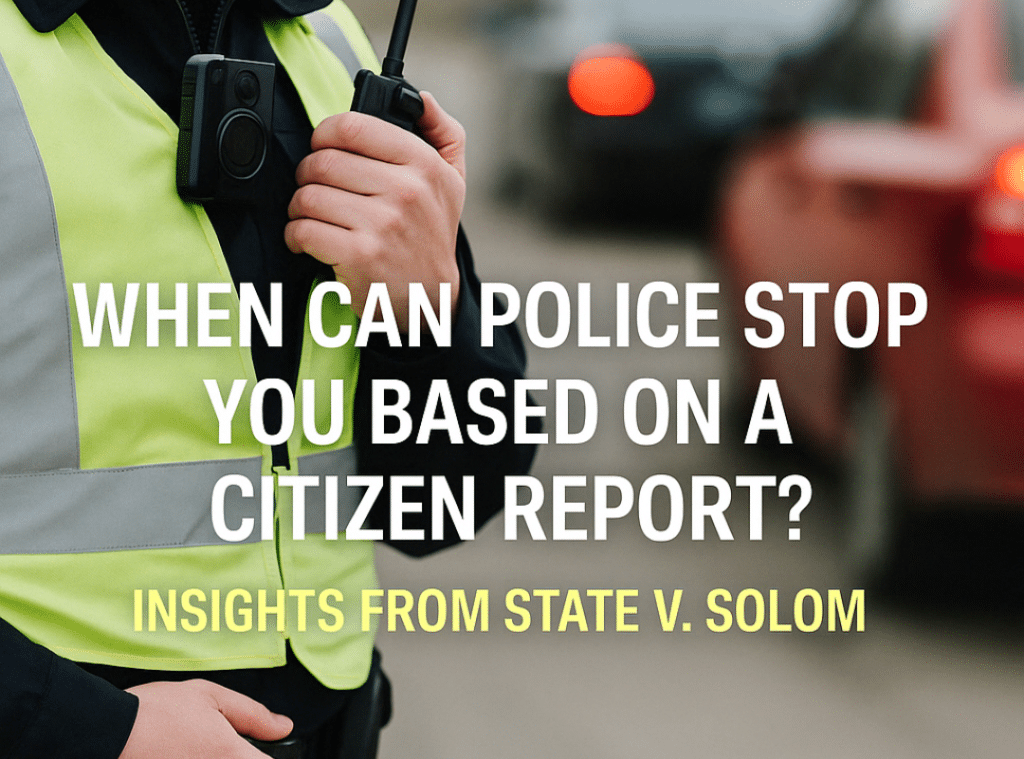
In Wisconsin, law enforcement officers frequently rely on tips from citizens to initiate traffic stops. But when is such a stop lawful? A recent decision from the Wisconsin Court of Appeals, State v. Solom, provides a detailed look into what qualifies as reasonable suspicion and how citizen reports, paired with officer observations, can justify a stop under the Fourth Amendment.
Case Background: State v. Solom
On January 28, 2022, a citizen witnessed a red Honda Civic run a stop sign and crash into a snowbank. The driver sped off westbound. Just minutes later, a Waukesha County sheriff’s deputy saw a red Honda Civic in the vicinity. The vehicle was weaving and fluctuating speed—signs often associated with OWI in Wisconsin.
The driver, Jody William Solom, was pulled over and charged with his sixth OWI offense. He moved to suppress evidence, arguing the stop lacked legal justification.
Court Ruling: Reasonable Suspicion Supported by Specificity
The Wisconsin Court of Appeals upheld the stop. Here’s why:
- Specific Description: The vehicle was a red Honda Civic, not a vague or generic vehicle type.
- Location & Timing: The car was located a mile from the incident, heading in the reported direction within minutes.
- Corroborating Behavior: The officer observed erratic driving, bolstering the tip with independent suspicion.
This case follows the standard from State v. Rutzinski, which allows officers to rely on tips when those tips are reasonably corroborated. Unlike State v. Richey, where vague information failed to justify a stop, Solom’s case involved specific details and timely observation.
What State v. Solom Means for OWI Stops in Wisconsin
This case highlights a few key takeaways for drivers:
- Officers may stop you if a reliable citizen report matches your vehicle and is timely corroborated.
- Observing even minor signs of impaired driving may independently establish reasonable suspicion for an OWI traffic stop.
- Courts will weigh the totality of the circumstances when evaluating the legality of a stop.
Learn more about how OWI charges are handled in Wisconsin and when anonymous tips can be used to stop and detain someone.
Protect Your Rights with DK Anderson, S.C.
If you’ve been pulled over and charged with OWI, and you believe the stop was unlawful or improperly based on a citizen report, don’t wait. The law is complex—and the sooner you speak to an experienced attorney, the stronger your defense will be.
At DK Anderson, S.C., we specialize in defending against OWI and criminal traffic charges across Wisconsin. Our team knows how to challenge unlawful stops and protect your constitutional rights. Whether you’re facing a first OWI or a sixth, we’re here to help.
Contact us today for a free consultation – (608) 204-5807
FAQs About Citizen-Based Traffic Stops in Wisconsin
Yes, if the report is detailed, timely, and comes from an identifiable or reliable source. The officer must also observe conduct that supports the claim or that the circumstances align with the report.
Not always. But if your car matches a specific description, and you’re located in the right area at the right time, this can support a lawful stop—especially when paired with observed erratic driving.
Contact a defense attorney immediately. You may be able to challenge the stop through a motion to suppress.
Our Practice Areas
Drunk Driving
Whether you are charged with a first offense, or a fifth offense, our Wisconsin OWI attorneys can help.
Violent Crimes
A conviction for any one of Wisconsin's violent crimes will have significant consequences.
Drug Charges
Our Wisconsin Drug charge attorneys know the law and how to apply that law in the court room.
Domestic Violence
A conviction for a domestic violence charge in Wisconsin has additional consequences.
Property Crimes
Wisconsin property crimes include theft, forgery, and criminal damage to property.
Sex Offenses
Not much will change your life like a conviction for one of Wisconsin's sex offense charges.
Traffic Citations
Although less serious than a criminal charge, a traffic citation can effect your driver's license.
